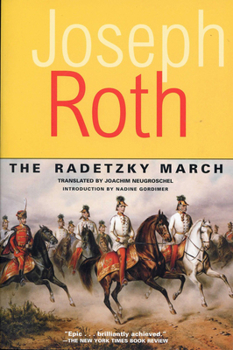Book Overview
"Epic . . . brilliantly achieved." (New York Times Book Review) The Radetzky March, Joseph Roth's classic saga of the privileged von Trotta family, encompasses the entire social fabric of the Austro-Hungarian Empire just before World War I. The author's greatest achievement, The Radetzky March is an unparalleled portrait of a civilization in decline, and as such a universal story for our times. This is a high-quality edition featuring an introduction from Nobel Prize winner Nadine Gordimer and translated by the acclaimed Joachim Neugroschel, who was the winner of three PEN Translation Awards.
Format:Paperback
Language:English
ISBN:1585673269
ISBN13:9781585673261
Release Date:August 2002
Publisher:Overlook Press
Length:352 Pages
Weight:0.73 lbs.
Dimensions:0.8" x 5.5" x 8.0"
Age Range:18 years and up
Grade Range:Postsecondary and higher
Related Subjects
Classics Contemporary Fiction Genre Fiction Historical Literary Literature & Fiction World LiteratureCustomer Reviews
5 ratings
Joseph Roth words on paper are most incredible.
Published by Wallander , 11 months ago
Joseph Roth was one helluva writer. His literary flair has to read to be believed. No review could give justice to this novel. Drop everything and get the book! Then you'll understand.
What a treasure!
Published by Thriftbooks.com User , 24 years ago
This is a masterpiece to be savored, celebrated, and shared. Straddling the nineteenth and twentieth centuries, The Radetzky March uniquely combines the color, pomp, pageantry, and military maneuvering of the last days of the Austro-Hungarian Empire with the more modern political and psychological insights of the twentieth century, giving this short book a panoramic geographical and historical scope with fully rounded characters you can truly feel for. Atmospheric effects are so rich and details are so carefully selected that you can hear the clopping of hooves, rattling of carriage wheels, clang of sabers, and percussion of rifles. Parallels between the actions of man and actions of Nature, along with seasonal cycles, bird imagery, and farm activity, permeate the book, grounding it and connecting the author's view of empire to the reality of the land. Loyalty, patriotism, and family honor are guiding principles here, even when these values impel the characters to extreme and sometimes senseless actions, as seen in a duel. Significantly, there are no birth scenes here, only extremely touching scenes of aging and death, adding further poignancy to the decline and fall of the empire itself. And just as Trotta, in the end, has the little canary brought in to him, commenting that "it will outlive us all," perhaps this novel, too, will someday emerge from its obscurity and live as the classic it deserves to be.
Magnificent novel of loss
Published by Thriftbooks.com User , 24 years ago
This is a truly great novel about disillusionment and loss set during the decline and death of the Austro-Hungarian Empire. Written in wonderfully deft and gently ironic prose, it chronicles three generations of a peasant family raised to the aristocracy through a heroic act. By choosing such protagonists, Roth is able to successfully contrast the naive, innocent faith in the monarchy of the Trottas against the actual moral and social collapse of AH society.However, unlike many a novelist, while Roth clearly understands why citizens grew disillusioned with pre-WW I society, he also notes the price paid by those who are disillusioned. Thus, while all the flaws of Viennese society are decried (corruption, anti-Semitism, incompetence), Roth evokes a genuine sympathy for a time when faith in society still existed.As the 20th century has been a perpetual and--given communism, fascism, nationalism et al.--failed search for some way to reconstruct the myths that held society together (which were destroyed by WW I), Roth's novel is as timely as ever. Treat yourself to this sad, touching novel which should be far better know than it is. Roth is one novelist who saw and understood.
A MASTERPIECE
Published by Thriftbooks.com User , 26 years ago
This is a novel so good that it is hard to find anything critical to say about it.Perhaps the reader needs to know a bit about the end of the Habsburg Monarchy first- try the relevant chapter of a good history textbook.Other than that ,this is a work of astonishing qualitites. The prose is written with extraordinary care: Roth's description of the appearance of things is beautiful in itself and becomes even more so when you realise that he is recording the details of a vanished way of life. There are scenes which really do deserve the overworked adjective 'unforgettable'.His prose is so clear, economical and precise that you have to compare him to somebody like Tolstoy. This book is hardly known at all in the English-speaking countries, which is a very great shame. Roth disapproved of his characters' actions and the Empire in which they lived and yet he managed to make me genuinely mourn the end of both the Habsburg Empire and the Trotta family.
one of the overlooked great novels of the twentieth century
Published by Thriftbooks.com User , 26 years ago
a truly great book. often compared to his countryman and rough contemporary robert musil, roth in radetzky march at least more closely approaches tolstoy in his combination of historic sweep and close observation. sad, funny, sweet and tart with irony, roth conjures up the dwindling years of the hapsburgs with uncanny accuracy and deep sympathy. as you read, you watch a world die, first slowly, through administrative incompetence and intellectual ennui, then through catastrophic loss in war. a wonder of literature. god knows, there are few enough of them. read it. and read the rest of roth -- particularly "the emporer's tomb," a sort of sequel to this novel.






